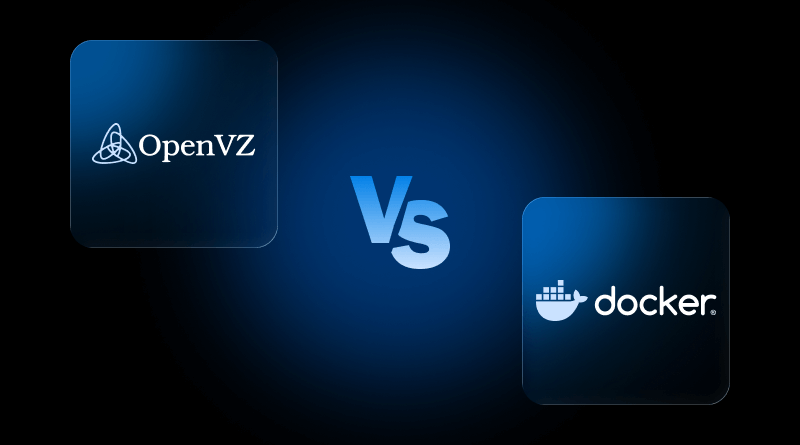The new age IT world revolves around virtualization and containerization. And the two most popular technologies are OpenVZ and Docker. These two technologies improvised the way we develop and deploy applications. While both offer distinct resource utilization and simplified management, there are distinct differences between them that impact the suitability for specific use cases. In this article, we’ll explore those differences to help you make a better choice for your organization’s needs.
Table Of Content
What is OpenVZ?

OpenVZ is known as an operating system virtualization where one physical server hosts multiple Linux containers or VPS. In simpler terms, several containers operate on one physical server. All containers share the same kernel but run in their own disk space. Hence, it enables efficient usage and management. OpenVZ found a wide application in the web hosting environment when there is an urgent need to create lightweight virtual environments.
What is Docker?

Docker is an open platform to automate the deployment, scaling, and application management using containerization. Its standard containerization mechanism solves the problem of inconsistent application behavior while moving code from a developer’s local machine to different testing or production environments. It effectively eliminates the “it works on my machine” issue. The core technology of Docker is different from traditional VMs. They are much lighter than VMs because they share the underlying host machine’s operating system kernel.
OpenVZ vs. Docker: Key Comparison Areas
1. Architecture
OpenVZ: OpenVZ operates by carving several containers using the same kernel. Each container acts like an independent virtual server with an independent file system, processes, and network interfaces. With no extra overhead in running separate kernels, this architecture is really high-performing.
Docker: Docker operates on the shared kernel architecture. However, it packages the application with libraries, dependencies, and everything needed to operate that application. In fact, that makes Docker containers portable and consistent, whether in a development or production environment.
2. Performance
OpenVZ: This technology assures high performance and low overhead in all containers that share the host OS kernel. It enables efficient resource usage to operate lightweight surroundings on one server.
Docker: In Docker, containers are lightweight with an average performance. Because Docker includes an additional packaging step (images plus the Docker engine), it’s less efficient than using OpenVZ alone. So, many modern applications don’t use it.
3. Segregating and Securing
OpenVZ: OpenVZ provides more isolation. Containers function independently in this technology. Because OpenVZ shares the same host kernel, it risks the security protocol, as any vulnerability could affect all containers.
Docker: Docker offers strong isolation and includes security features like user namespaces and integrated SELinux. All these factors reduce cyberattack risks. It is great at delivering applications, but users need to pay attention to security configurations with respect to containers.
4. Ease of Use
OpenVZ: If you are a Linux user, setting up OpenVZ is easier for you. However, technical expertise is required to manage containers. So, beginners need to acquire knowledge to set up and manage containers.
Docker: Docker is easier to use. It has a command-line and GUI interface, which are user-friendly for beginners and professionals alike. Both OpenVZ and Docker offer unique advantages depending on your specific needs and level of expertise. As you explore these technologies, consider your project requirements and the support available to help you along the way.
Use Cases: OpenVZ vs Docker
OpenVZ Use Cases
1. Virtual Private Server (VPS) Hosting
OpenVZ’s main usage is to create isolated, persistent Virtual Environments (VEs), which function like lightweight VPS instances. So, web hosting providers maximize the density of users on a single physical machine and get higher performance overhead compared to full hardware virtualization.
2. High-Density Server Consolidation
OpenVZ is excellent for scenarios requiring maximum resource efficiency and the ability to run many isolated Linux instances on a single host. As all containers share the host’s kernel, there is no need to load multiple kernels. It results in lower RAM usage and faster container start time.
3. Traditional Multi-Service Application Hosting
OpenVZ VEs are designed to run an operating system environment. It is suitable for traditional hosting, monolithic applications or a typical web stack. In this, applications, web servers, applications, and the database are all managed within one container. The environment is treated as a fully managed server by the end-user.
Docker Use Cases
1. Microservices and Application Deployment
Docker’s core strength lies in its ability to encapsulate an entire application along with its dependencies into a portable, self-sufficient package. This is what makes it the most popular solution for contemporary microservices architecture, in which sophisticated applications are decomposed into small, independently deployed units that communicate with each other. It ensures that the application runs consistently from a developer’s laptop to staging and production environments.
2. Continuous Integration/Continuous Deployment (CI/CD)
Docker lays the foundational stone of new-age DevOps and CI/CD pipelines. Containers are built and tested locally and then deployed to production with a high degree of confidence that they will behave identically. This eliminates the “it works on my machine” problem by using the container image as a guarantee.
3. Development and Testing Environment Standardization
Developers use Docker with standardized environments, ensuring every team member and every automated test is running the code in the exact same configuration. A Dockerfile specifically declares the base operating system, the libraries installed, and the application code, making it easy for developers to generate complicated applications containing many containers (often with tools to orchestrate containers, such as Docker Compose) for local development, rapid prototyping, and bug production.
OpenVZ and Docker are fundamentally different in focus. OpenVZ is primarily designed for operating system (OS) virtualization and server consolidation. It is the original VPS provider, a stable way to divide a single server into multiple isolated environments and share the kernel of the host OS. OpenVZ is a logical choice to you if your focus is on efficiently managing your physical server capacity.
Docker is the ultimate application containerization tool and the most modern development option.It packages applications and their dependencies into highly portable containers, enabling a consistent journey from development to production.
FAQs
1. Do OpenVZ and Docker use the same type of kernel?
Both technologies rely on OS level virtualization and both utilize the host Linux kernel, but OpenVZ over time used a highly patched/modified kernel for the purpose of isolation whereas Docker technology stands to leverage the built-in functionality provided by the Linux kernel (i.e., cgroups and namespaces).
2. How is an OpenVZ Virtual Environment (VE) different from a Docker container (image)?
OpenVZ VE is a full managing OS-like environment (lightweight VPS) that has its own init system and persistent storage while Docker is designed to be used to encapsulate and run a single application or process in an efficient manner.
3. What is the primary purpose or philosophy behind OpenVZ compared to Docker?
OpenVZ has taken the philosophy of server consolidation (divisions of a physical server into VPS units), whereas Docker follows application agility, portability, and microservices (packaging a single application for consistent deployments).
4. Which technology is better suited for a high-density VPS hosting provider?
OpenVZ (or its commercial version, Virtuozzo) is usually the better choice for higher-density VPS hosting because it has resource management tools that are specialized and kernel-level, which allow for better allocation and overselling of resources to multiple OS-like containers (VEs).














